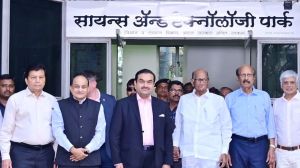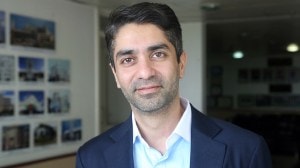Not consenting adults?
Finally, the intimate nature of the BJP8217;s relationship with the Samajwadi Party is out in the open. But the chumminess is not a new fla...

Finally, the intimate nature of the BJP8217;s relationship with the Samajwadi Party is out in the open. But the chumminess is not a new flavour, it has existed all through and was amply manifested on plenty of occasions during the NDA rule. Just before the Lok Sabha elections this year, Atal Behari Vajpayee had counted the SP as among the BJP8217;s friends. Sensing trouble, Mulayam Singh Yadav had decided to deny it. On the other hand, nobody could deny that the SP would have found an excuse to back the NDA if the latter were only 40 or thereabout seats away from a majority.
The same was again evident at a recent platform in Lucknow, where Vajpayee openly courted friendship with the SP. The difference this time was that Mulayam was right there on the platform with Vajpayee. Later, SP leaders, led by Mulayam himself, wasted little time in justifying the bonhomie betrayed by Vajpayee. The relationship was declared to exist in national interest. BJP state chief Kesari Nath Tripathi echoed the same in Jhansi later on.
Some senior BJP leaders have long held the view that there is no harm in sacrificing UP in favour of Mulayam if the BJP gets to keep the Centre as quid pro quo. The BJP had even expelled five of its members to help Mulayam to a majority.
It is only pressure from BJP workers and some state leaders that is maintaining the status quo. Whether this pressure is sufficient is a hard guess to make. What can be guessed is that something is definitely cooking in the BJP8217;s kitchen. Another proof is the number of dinners that are being hosted in Delhi bungalows where leaders from the two parties can socialise. Even in Parliament, the chemistry between the two parties is hard to miss.
My point is not to decry the association between the two parties; I am only against a clandestine one that seeks to deceive the public. If you think you can share a relationship, why not come out openly, hold a press conference and see the public in its face? Why fear wrath of the Muslims and backlash from the Congress?
Tribute from a scribe
Late P V Narasimha Rao has been saluted in the press today as the Chanakya of Indian politics and the father of Indian economic reforms. But one aspect of Rao overlooked in the media is the indifference the man showed for it. He was never a media-driven politician and he never bothered about the press. Consequently, he had very few friends in the media.
His discomfort was often the highlight of the press conferences he attended. Often all he had in reply to a long-worded question was a simple nod of the head, which in itself was routinely misinterpreted.
But he knew his words too. When criticised for lack of ability to take timely decisions, he was probably the only person to come up with the now classic repartee: 8216;8216;Not taking a decision is a decision in itself.8217;8217; He often formulated strategy for himself and expected others to fall in line and back him.
The demolition of Babri Masjid was an event profound enough to have brought down any prime minister. But it was Rao indeed who not only managed to hold on to the saddle but also put together an unlikely consensus for his leadership. Not just this, he would even muster support of about 200 Imams, who were prompt to felicitate him at the highest Islamic seat in the country.
I met him last on a flight to Lucknow early this year where we sat next to each other and had plenty of airtime to discuss things. He was a little peeved at the erstwhile NDA government for taking full credit for all the good things that were happening to the country. The forex reserves were up, the highways were coming up faster than ever and the economic reforms were bringing expected results, and the NDA said it had been their doing. Rao in turn exhorted me and the party to neutralise this misinformation campaign and to stake a justified claim on all three counts, since they all had their origin in the Rao government.
Judicial watchdog
The National Judicial Commission Bill was introduced in the Lok Sabha before the elections this year, but the ensuing elections had a chilling effect on it and the Bill lapsed, confined to cold storage. A sad development indeed, for a national-level judicial commission is the order of the day. Routine aberrations in the judiciary is one of the stronger reasons for setting it up. While there are chronic complaints against judges at the higher levels of judiciary, it is the almost rotten state of lower judiciary that gets no media and deserves all the attention.
It8217;s good that chief justices hold enough competency in complaints against judges but it will also be good if the proposed commission is seen as initiator of fundamental changes in administration of the judiciary. In any case, the commission has to be headed by a former judge itself.
In my view, 50 per cent of the judges for high courts should be picked up from eminent lawyers the conventional way, while for the remaining 50 per cent, an all-India judicial services exam should be instituted on the pattern of the civil services exam.
- 01
- 02
- 03
- 04
- 05































